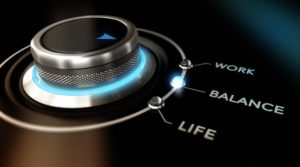The Importance of Work-Life Balance
“I’ve learned that you can’t have everything
and do everything at the same time.”
Oprah Winfrey
 In our work as coaches, this may be the number one subject of many of our coaching conversations. We all want it AND we all have plenty of trouble achieving it!
In our work as coaches, this may be the number one subject of many of our coaching conversations. We all want it AND we all have plenty of trouble achieving it!
Lohrer & Schwartz say in their book, The Power of Full Engagement, that the skillful management of energy, NOT TIME, is the key to high performance, health and happiness. In order to have balance in our lives we must be physically energized, mentally focused, emotionally connected, and spiritually aligned. To build either our individual capacity or organizational capacity we must exercise the muscles in each of these areas of our lives.
It is really a paradox: One increases his or her productivity by focusing on life balance, contribution, and celebration. By keeping oneself balanced and happy, you deliver more productively in your work.
However, Bryan Robinson notes in Chained to the Desk, that “we have become a nation that enables workaholics—unbalanced and out of control and unable to slow down and nurture ourselves and our loved ones.”
The “push” to work is seen in all of our work places. Two studies in 2001 Public Agenda for the National Association of Secondary School Principals indicated that the average work week of administrators is 62 hours. With the continuing decline of financial support and increasing demands from government mandates, administrators feel pressured to increase work time even more. In the process of meeting the demands of the job, it’s very easy to sacrifice some of our basic needs, especially those that involve family and friends.
Work-life balance means something different to every individual. Below, health and career experts share tips to help you find the balance that’s right for you. This comes from Deborah Jian Lee, a contributor for Forbes.
1. Let go of perfectionism
Perfectionism becomes out of reach, and if that habit is left unchecked, it can become destructive, says executive coach Marilyn Puder-York, PhD, who wrote The Office Survival Guide.
The key to avoid burning out is to let go of perfectionism, says Puder-York. “As life gets more expanded it’s very hard, both neurologically and psychologically, to keep that habit of perfection going,” she says, adding that the healthier option is to strive not for perfection, but for excellence.
2. Unplug
Technology has helped our lives in many ways. But it has also created expectations of constant accessibility. The work day never seems to end. Make quality time true quality time by not reacting to the updates from work while you are with your family and friends.
3. Exercise and meditate
One of our most crucial needs – exercise – is often the first thing to go when our calendars fill up. Exercise is an effective stress reducer. It pumps feel-good endorphins through our body.
4. Limit time-wasting activities and people
Assess your priorities and then draw firm boundaries so you can devote quality time to these high-priority people and activities. From there it will be easier to determine what needs to be trimmed from your schedule. Focus on the people and activities that reward you the most.
5. Change the structure of your life
Sometimes we fall into a rut and assume our habits are set in stone. Take a birds-eye view of your life and ask yourself: What changes could make life easier? So instead of trying to do it all, focus on activities you specialize in and value most. Delegate everything else.
6. Start small – Build from there
In our eagerness to see the changes we want to see, we often move too quickly and with too much expectation, which is back to the perfectionism noted in number one above. Instead of working 40 hours a week, we set the goal of 20 hours a week which sets us up for failure. Instead, we may start small by committing to leave early 2 days of the week or staying late only 1 day of the week instead of 4. This is how we eat an elephant . . . “One bite at a time!”
What are your best strategies for optimizing work-life balance in 2018?